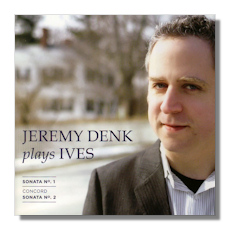
The Internet's Premier Classical Music Source
Related Links
- Ives Reviews
- Latest Reviews
- More Reviews
-
By Composer
-
Collections
DVD & Blu-ray
Books
Concert Reviews
Articles/Interviews
Software
Audio
Search Amazon
Recommended Links
Site News
 CD Review
CD Review
Charles Ives

Jeremy Denk Plays Ives
- Piano Sonata #1
- Piano Sonata #2 "Concord" *
Jeremy Denk, piano
* Tara Helen O'Connor, flute
Think Denk Media 2567
This is one of those CDs which seem to be designed to promote the player first and the composer second: "JEREMY DENK plays IVES". Indeed, the notes in the nicely-produced booklet that comes with the CD begin, "A fair number of people ask me after concerts why I perform Ives – why I'm drawn to him – and the answer proves difficult to communicate [sic] at your average cocktail party." Self-conscious pseudo chic? Perhaps. Certainly a fair dollop of self-promotion in the CD label: TDM seems to stand for Think Denk Media, "denken" anyway being the German for "to think", of course. The website (not regularly updated) goes further and quotes Alex Ross… "The pianist Jeremy Denk has established himself as perhaps the leading humorist-intellectual of the classical-music blogosphere"; so presumably he adds a zany gloss to his playing. Let's examine it.
Denk's is certainly competent playing of the Ives piano sonatas 1 and 2 ("Concord"). His notes in the booklet demonstrate perception and insight into why and how Ives wrote as he did. Denk tackles the sonatas with all their difficulties in swinging fashion and works his way through with barely a hint of any worries at the enormity of the pianistic task. He never lingers; yet uses ritardando effectively when it counts – two thirds of the way through the first, "Emerson", movement of the Concord [tr.8], for example. This, together with his close attention to dynamic – ppp a little later in the same movement – for instance, makes every effect that Ives intended sound as large as life. Specifically in the case of this Second Sonata these effects provide a plausible relief or backdrop for the Beethovenian quotation.
On the other hand, might Denk just be trying a little too hard? He's clearly well attuned to the nuances and technicalities of Ives' style. Indeed, his technique is impressive. He handles the shocks of wildly contrasting dynamics in the Second Sonata in particular most convincingly and without missing a beat. But his phrasing and tempi tend to pull the music along with him; as though he were using its dissonances and proto-ragtime (in the second, "Hawthorne". movement of the Concord [tr.9], say) rhythms to make a point about how much fun it all is. Rather than scoop out the essence of the music. For sure, Ives intended to entertain his listeners. And fun should be no stranger to our experience of this music. As did Mahler and Shostakovich in their ways, Ives used popular song, band music, quotes from Beethoven and Liszt and so on in his quotations. They have been absorbed into the solo piano idiom. And become their own referents. At times one suspects that Denk is trying to single this inclusion back out and attach "cool"-ness to its presence. It doesn't need this.
If, on the other hand, you respond to the broad and informed advocacy for Ives' music and for its place in the romantic repertoire with which Denk infuses this performance and its presentation here, then this is certainly the CD for you. The First Sonata is given every bit as much close attention as is the Concord, occupying the first half hour on this 70-minute CD. It's not an electrifying performance. It aims to expose Ives' style and development as well as to provide a performance to remember. And does so. In all, Denk's is a very enjoyable and accessible account of Ives. As the flute (Tara Helen O'Connor) and piano take their farewell in the fifth movement of the Concord, you realize that – despite a hint of attention to the music's surface, which is not to say that Denk's understanding of it is superficial – it's been an immensely enjoyable experience.
But it does seem to be performer first and the essence of Ives second. Not a distant second when it's thanks to the insight, enthusiasm and technique of Denk. But second nevertheless. Ives needs a detachment and dignity which recordings like those of, say, Peter Lawson on Virgin Classics (61928) and Marc-André Hamelin on New World Records (80378) provide. These are both old recordings, though, and neither sonata is exactly over-represented in the current catalog. So you could do a lot worse that get Denk's accounts of both on a single coupling. The recording quality is excellent.
Copyright © 2010 by Mark Sealey.



















